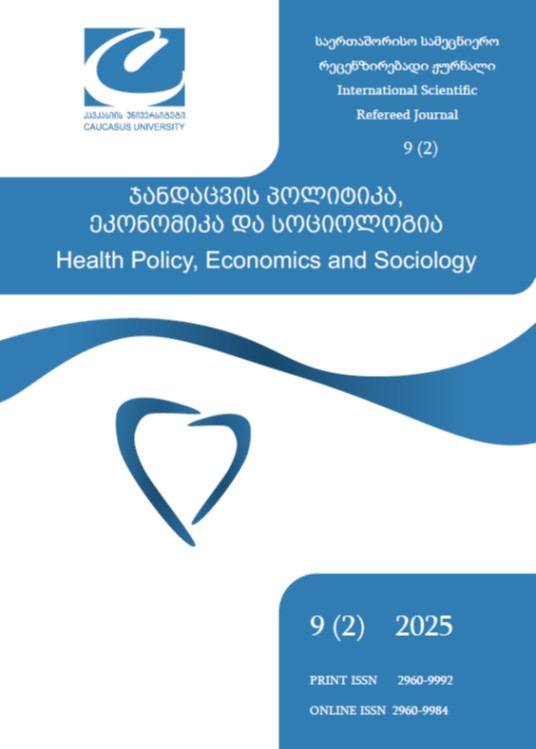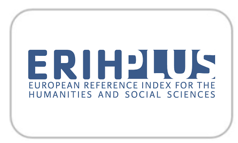„Adolescence” - A sociological analysis of juvenile deviance in the digital age
DOI:
https://doi.org/10.52340/healthecosoc.2025.09.02.02Keywords:
Adolescence (2025), digital literacy, adolescence, sociological film analysis, social labelling, online radicalization, incel culture, hegemonic masculinity, juvenile devianceAbstract
Introduction: This paper examines from a sociological perspective the British TV series „Adolescence” (2025) in order to investigate how juvenile deviance is represented in the contemporary digital context and how concepts such as toxic masculinity, online radicalization and marginalization of adolescents are reflected. The paper proposes an integrated theoretical approach, using concepts from the sociology of deviance, media theories and cultural studies. Methodology: The analysis is based on a qualitative methodology, applying narrative and visual content analysis of the series. Relevant theoretical frameworks such as labelling theory (Erving Goffman), ideology of hegemonic masculinity (Raewyn Connell), subculture theory (Albert K. Cohen), social learning theory (Albert Bandura) and social control theory (Travis Hirschi) are used. Key scenes, lines and visual contexts that support sociological interpretations are identified. Results: The series highlights the complexity of juvenile deviance as a result of the interplay between personal, social and technological factors. Jamie, the protagonist, is constructed as a symbol of societal failure to protect, understand and guide adolescents in the digital context. Hegemonic masculinity, lack of family support, 'incel' culture and exposure to misogynistic discourses online contribute to his alienation and radicalization. The institutional reaction and subsequent stigmatization confirm the hypotheses of social labelling theory. The series thus functions as a critical cultural text, highlighting the risks of normalizing violence and gender inequality in male identity formation. Conclusions: “Adolescence” provides a sociologically relevant portrayal of the crisis of adolescent masculinity and adolescent vulnerability in the digital age. The series contributes to the public debate on emotional literacy, digital literacy and the prevention of youth violence, becoming a valuable tool for research, education and public policy. The paper argues for the need for systemic interventions targeting family support, school involvement and regulation of the online environment as forms of protection against contemporary juvenile deviance.
References
Bains, R. M. (2014). African American Adolescents and Mental Health Care: A Metasynthesis. Journal of Child and Adolescent Psychiatric Nursing, 27(2), 83–92. https://doi.org/10.1111/jcap.12074
Benekos, P. J., & Merlo, A. V. (2016). A Decade of Change: Roper v. Simmons, Defending Childhood, and Juvenile Justice Policy. Criminal Justice Policy Review, 30(1), 102–127. https://doi.org/10.1177/0887403416648734
Bernabe, A. J. (2025). Netflix’s “Adolescence” to be made available to UK secondary schools: Here’s why parents are talking - ABC News. Retrieved May 31, 2025, from https://abcnews.go.com/GMA/Culture/adolescence-netflix-limited-series/story?id=119968581&utm_source=chatgpt.com
Breckin, E. (2018). How Can Conditional Cash Transfers Diminish Crime? An Application of Travis Hirschi?s Social Control Theory, 06(02). https://doi.org/10.35248/2375-4435.18.6.192
Case, A. D., & Hunter, C. D. (2014). Counterspaces and the Narrative Identity Work of Offender‐labeled African American Youth. Journal of Community Psychology, 42(8), 907–923. https://doi.org/10.1002/jcop.21661
Dishion, T. J., Owen, L. D., & Bullock, B. M. (2004). Like Father, Like Son: Toward a Developmental Model for the Transmission of Male Deviance Across Generations. European Journal of Developmental Psychology, 1(2), 105–126. https://doi.org/10.1080/17405620444000094
Girvin, J., Jackson, D., & Hutchinson, M. (2016). Contemporary Public Perceptions of Nursing: A Systematic Review and Narrative Synthesis of the International Research Evidence. Journal of Nursing Management, 24(8), 994–1006. https://doi.org/10.1111/jonm.12413
Hartanto, D., Fauziah, M., Sewoko, E., & Karsih, K. (2022). Systematic Review: A Literature Review on Systematic Integrative Intervention Model for Klitih Issue in Yogyakarta. Psikopedagogia Jurnal Bimbingan Dan Konseling, 10(2), 94. https://doi.org/10.12928/psikopedagogia.v10i2.22844
Hartung, F. E., & Cohen, A. K. (1955). Delinquent Boys: The Culture of the Gang. American Sociological Review, 20(6). https://doi.org/10.2307/2088683
Heckert, A., & Heckert, D. M. (2004). Using an Integrated Typology of Deviance to Analyze Ten Common Norms of the U.S. Middle Class. Sociological Quarterly, 45(2), 209–228. https://doi.org/10.1525/tsq.2004.45.2.209
Hogan, M. (2025). From the police to the prime minister: how Adolescence is making Britain face up to toxic masculinity | Adolescence | The Guardian. Retrieved May 31, 2025, from https://www.theguardian.com/tv-and-radio/2025/mar/22/netflix-from-the-police-to-the-prime-minister-how-adolescence-is-making-britain-face-up-to-toxic-masculinity?utm_source=chatgpt.com
Jacob, L. (2025). Adolescence: I was stunned by Netflix hit show filmed in Yorkshire - it backed up my decision to quit social media. Retrieved May 31, 2025, from https://www.yorkshirepost.co.uk/arts-and-culture/film-and-tv/adolescence-i-was-stunned-by-netflix-hit-show-filmed-in-yorkshire-it-backed-up-my-decision-to-quit-social-media-5049794?utm_source=chatgpt.com
James, W., Demony, C., & Mills, S. (2025). “Adolescence” TV drama exposes global issue of teenage violence | Reuters. Retrieved May 31, 2025, from https://www.reuters.com/business/media-telecom/adolescence-tv-drama-exposes-global-issue-teenage-violence-2025-04-07/?utm_source=chatgpt.com
Korde, P., & Raghavan, V. (2023). Understanding Deviance From the Perspectives of Youth Labelled as Children in Conflict With Law in Mumbai, India. The Howard Journal of Crime and Justice, 62(2), 242–263. https://doi.org/10.1111/hojo.12511
Kupper, J., Cotti, P., & Meloy, J. R. (2024). The Hanau Terror Attack: Unraveling the Dynamics of Mental Disorder and Extremist Beliefs. Journal of Threat Assessment and Management, 11(3), 149–185. https://doi.org/10.1037/tam0000201
Langabeer, J. (2025). TV review: ‘Adolescence’…and how the system fails young people – Left-Horizons. Retrieved May 31, 2025, from https://www.left-horizons.com/2025/03/19/tv-review-adolescence-and-how-the-system-fails-young-people/?utm_source=chatgpt.com
Ligorio, M. B., & Ritella, G. (2010). The Collaborative Construction of Chronotopes During Computer-Supported Collaborative Professional Tasks. International Journal of Computer-Supported Collaborative Learning, 5(4), 433–452. https://doi.org/10.1007/s11412-010-9094-4
Lodding, L. R. (2025). Global Child Forum Launches ‘Listen Up!’ – Putting Young Voices at the Centre of Digital Wellbeing. Retrieved May 31, 2025, from https://globalchildforum.org/press-release-global-child-forum-launches-listen-up-putting-young-voices-at-the-centre-of-digital-wellbeing/
Miliauskas, C. R., Faus, D. P., Cruz, V. L. da, Vallaperde, J. G. R. do N., Junger, W. L., & Lopes, C. S. (2022). Community Violence and Internalizing Mental Health Symptoms in Adolescents: A Systematic Review. BMC Psychiatry, 22(1). https://doi.org/10.1186/s12888-022-03873-8
Mukolo, A., Heflinger, C. A., & Wallston, K. A. (2010). The Stigma of Childhood Mental Disorders: A Conceptual Framework. Journal of the American Academy of Child & Adolescent Psychiatry, 49(2), 92–103. https://doi.org/10.1097/00004583-201002000-00003
Murji, K. (2020). Stuart Hall as a Criminological Theorist-Activist. Theoretical Criminology, 24(3), 447–460. https://doi.org/10.1177/1362480619889106
Mytton, J., Ingram, J., Manns, S., & Thomas, J. (2013). Facilitators and Barriers to Engagement in Parenting Programs. Health Education & Behavior, 41(2), 127–137. https://doi.org/10.1177/1090198113485755
Nkomo, S. M. (2011). A Postcolonial and Anti-Colonial Reading of ‘African’ Leadership and Management in Organization Studies: Tensions, Contradictions and Possibilities. Organization, 18(3), 365–386. https://doi.org/10.1177/1350508411398731
O’Hanlon, R., Altice, F. L., Lee, R. K.-W., LaViolette, J., Mark, G., Papakyriakopoulos, O., … Kumar, N. (2023). Misogynistic Extremism: A Scoping Review. Trauma Violence & Abuse, 25(2), 1219–1234. https://doi.org/10.1177/15248380231176062
Oasis Da Service. (2025). “Adolescence” & Toxic Masculinity: The Dark Reality Behind Netflix’s Drama. Retrieved June 1, 2025, from https://www.oasisdaservice.org/the-link-between-online-toxic-maculinity-and-domestic-abuse/
Petersen, I. T., Bates, J. E., Dodge, K. A., Lansford, J. E., & Pettit, G. S. (2014). Describing and Predicting Developmental Profiles of Externalizing Problems From Childhood to Adulthood. Development and Psychopathology, 27(3), 791–818. https://doi.org/10.1017/s0954579414000789
Raza, M. (2023). The Multilevel Engagement Theory. International Journal of Qualitative Research, 2(3), 223–237. https://doi.org/10.47540/ijqr.v2i3.772
Rober, P., Walravens, G., & Versteynen, L. (2011). “In Search of a Tale They Can Live With”: About Loss, Family Secrets, and Selective Disclosure. Journal of Marital and Family Therapy, 38(3), 529–541. https://doi.org/10.1111/j.1752-0606.2011.00237.x
Shafi, A. A. (2025). UoG professor hails impact of Netflix series Adolescence in raising important questions for society - University of Gloucestershire. Retrieved June 1, 2025, from https://www.glos.ac.uk/content/uog-professor-hails-impact-of-netflix-series-adolescence-in-raising-important-questions-for-society/
Silva, J. R. (2019). Mass Shooting Films: Myths, Academic Knowledge, and Popular Criminology. Victims & Offenders, 14(2), 239–264. https://doi.org/10.1080/15564886.2019.1580232
Smith, B. (2013). Disability, Sport and Men’s Narratives of Health: A Qualitative Study. Health Psychology, 32(1), 110–119. https://doi.org/10.1037/a0029187
Valdez, C. R., Carlson, C., & Zanger, D. (2005). Evidence-Based Parent Training and Family Interventions for School Behavior Change. School Psychology Quarterly, 20(4), 403–433. https://doi.org/10.1521/scpq.2005.20.4.403
Young, C. (2025). What Adolescence gets right (and wrong) about the manosphere | Pursuit by the University of Melbourne. Retrieved May 31, 2025, from https://pursuit.unimelb.edu.au/articles/what-adolescence-gets-right-and-wrong-about-the-manosphere














